Geothermal Heat Pumps
Your Trusted Guide to Heating and Cooling Solutions
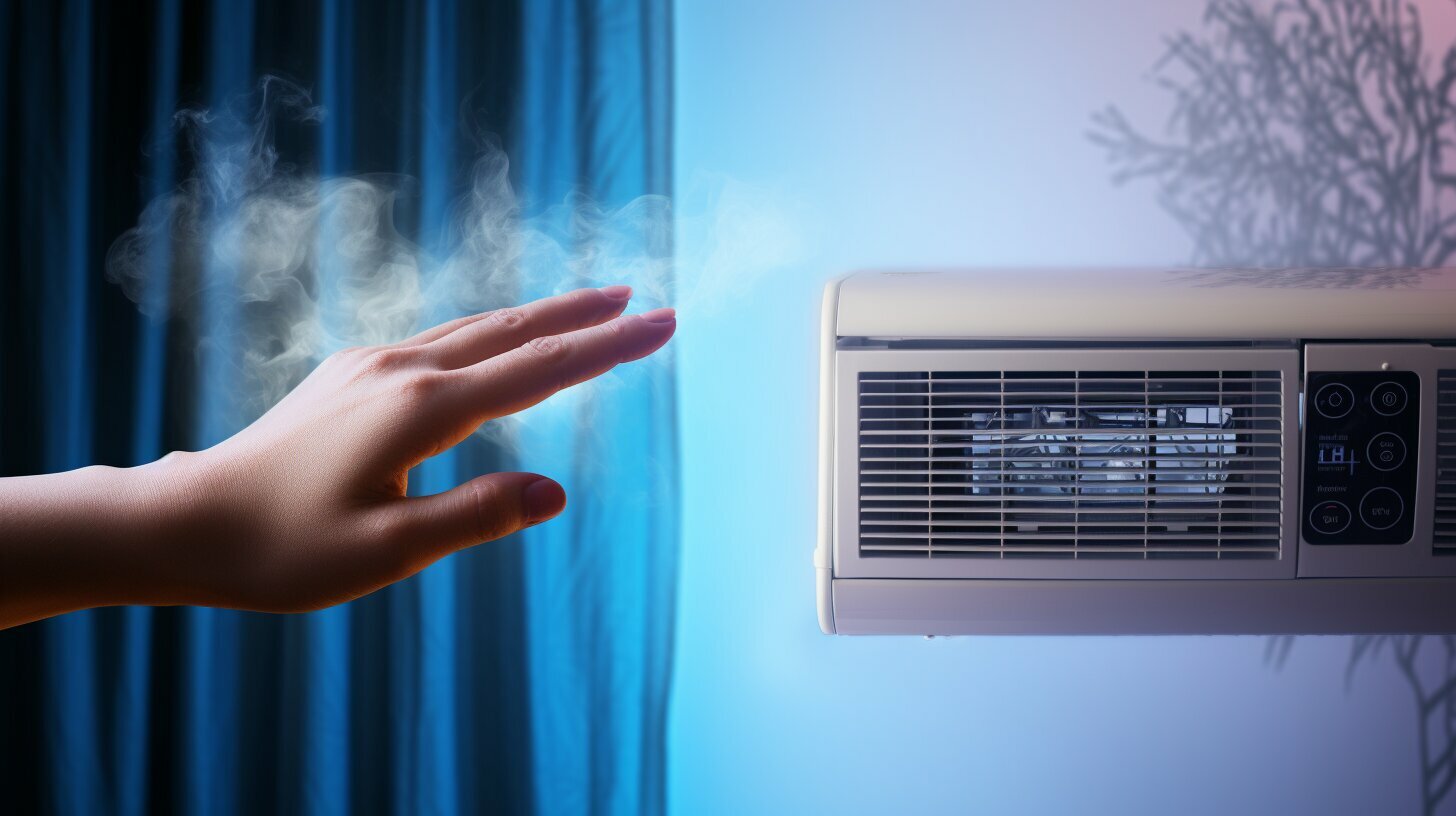
As a homeowner, it’s important to understand the basics of your HVAC system. HVAC stands for heating, ventilation, and air conditioning, and it includes everything related to heating and cooling your home. This includes the vents, ducts, and the systems themselves such as furnaces, air conditioners, and heat pumps. Regular maintenance and repairs are crucial to keeping your HVAC system running smoothly and efficiently. It’s also important to consider upgrades and replacements when necessary to improve energy efficiency and overall comfort in your home.
Key Takeaways:
- Regular maintenance and repairs are crucial for optimal HVAC system performance.
- Understanding the components of your HVAC system is essential for troubleshooting and making informed decisions.
- Upgrading to energy-efficient HVAC systems can save you money in the long run.
- Working with a reliable HVAC contractor ensures professional installation and quality service.
- Air quality solutions, such as ductless heating and cooling, can enhance your indoor environment.
What Is an HVAC System and How Does It Work?
An HVAC system, which stands for heating, ventilation, and air conditioning, is responsible for keeping your home comfortable by providing heating and cooling. It consists of various components such as furnaces, air conditioners, heat pumps, and ductwork. Understanding how an HVAC system works can help you identify potential issues and ensure proper maintenance.
The process begins with the heating component of the system. When the temperature drops, the furnace or heat pump is activated to generate warmth. This warm air is then distributed throughout your home via ductwork and vents.
On the other hand, during the warm months, the air conditioning component of the system kicks in. The air conditioner extracts heat from the indoor air, cooling it down through a refrigeration cycle. The cooled air is then circulated back into your home through the vents and ducts.
It’s important to note that the vents and ducts play a crucial role in an HVAC system. They distribute the conditioned air to different rooms, ensuring a consistent and comfortable indoor temperature throughout your home. However, over time, dust and debris can accumulate in the vents and ducts, hindering the system’s efficiency. Regular maintenance by a heating and AC repair company is essential to clean out any dust and debris and ensure optimal performance of your HVAC system.
Table: Components of an HVAC System
| Component | Function |
|---|---|
| Furnace | Generates heat for the heating component of the system |
| Air Conditioner | Extracts heat from the indoor air to cool it down |
| Heat Pump | Provides both heating and cooling by transferring heat between the indoor and outdoor air |
| Ductwork | Transports the conditioned air to different rooms in your home |
| Vents | Allows the conditioned air to enter rooms and maintain a comfortable temperature |
“Maintaining the cleanliness of your HVAC system is crucial for its efficiency and longevity. Regular maintenance by a heating and AC repair company can help prevent issues caused by dust and debris accumulation in the vents and ducts.”
The Importance of Seasonal Maintenance for Your HVAC System
Regular maintenance is essential for keeping your heating and cooling systems in optimal condition throughout the year. Seasonal maintenance, in particular, plays a crucial role in ensuring the efficiency and longevity of your HVAC system.
During seasonal maintenance, a professional heating and AC repair company will inspect and tune up your system to address any potential issues before they become major problems. This includes checking and replacing air filters, cleaning the AC unit, inspecting the furnace, and conducting any necessary repairs.
By scheduling seasonal maintenance twice a year, ideally in the spring and fall, you can ensure that your HVAC system is prepared for the demands of the upcoming season. Regular maintenance not only improves system performance but also helps to prevent unexpected breakdowns, reduce energy consumption, and extend the lifespan of your heating and cooling systems.
| Maintenance Tasks | Benefits |
|---|---|
| Checking and replacing air filters | Improves indoor air quality and prevents strain on the system |
| Cleaning the AC unit | Enhances cooling efficiency and reduces energy consumption |
| Inspecting the furnace | Detects and resolves issues to ensure proper heating performance |
| Conducting necessary repairs | Addresses minor issues before they become major and costly problems |
In addition to seasonal maintenance, it is also important to prioritize regular air filter changes and occasional duct cleaning. Air filters should be replaced every one to three months depending on usage, while duct cleaning helps to remove accumulated dust and debris that can hinder airflow and affect indoor air quality.
By investing in seasonal maintenance and following a regular maintenance schedule, you can enjoy reliable heating and cooling performance, improved energy efficiency, and enhanced indoor comfort throughout the year.
Regular maintenance is the key to a healthy and efficient HVAC system. By scheduling seasonal tune-ups and addressing any issues promptly, you can avoid unexpected breakdowns and ensure that your system operates at its best.
The Importance of Air Filters for Your HVAC System
When it comes to maintaining good indoor air quality and protecting your HVAC system, air filters play a crucial role. They are designed to trap dust, allergens, and other contaminants before they can circulate in your home, keeping the air clean and improving the overall health and comfort of your living space. Regularly changing your air filters is essential to prevent clogs and maintain optimal system performance. The frequency of filter changes depends on factors such as the size of your home, the number of occupants, and the presence of pets.
There are different types of air filters available on the market, each with its own level of filtration. Generally, air filters are rated on a scale known as the Minimum Efficiency Reporting Value (MERV), which indicates their effectiveness at capturing particles. Filters with higher MERV ratings offer better filtration but may also restrict airflow. It’s important to find a balance between filtration and airflow to ensure your HVAC system operates efficiently.
| Type of Air Filter | Efficiency | Airflow Restriction |
|---|---|---|
| Fiberglass Filters | Low | Minimal |
| Pleated Filters | Moderate to High | Low to Moderate |
| Electrostatic Filters | High | Moderate |
| HEPA Filters | Very High | High |
Depending on your specific needs, a heating and AC repair expert can help you determine the right type of air filter for your HVAC system. They can also provide guidance on the recommended filter replacement schedule based on your home’s characteristics. By keeping your air filters clean and up to date, you can ensure that your HVAC system operates efficiently and maintains good indoor air quality for you and your family.
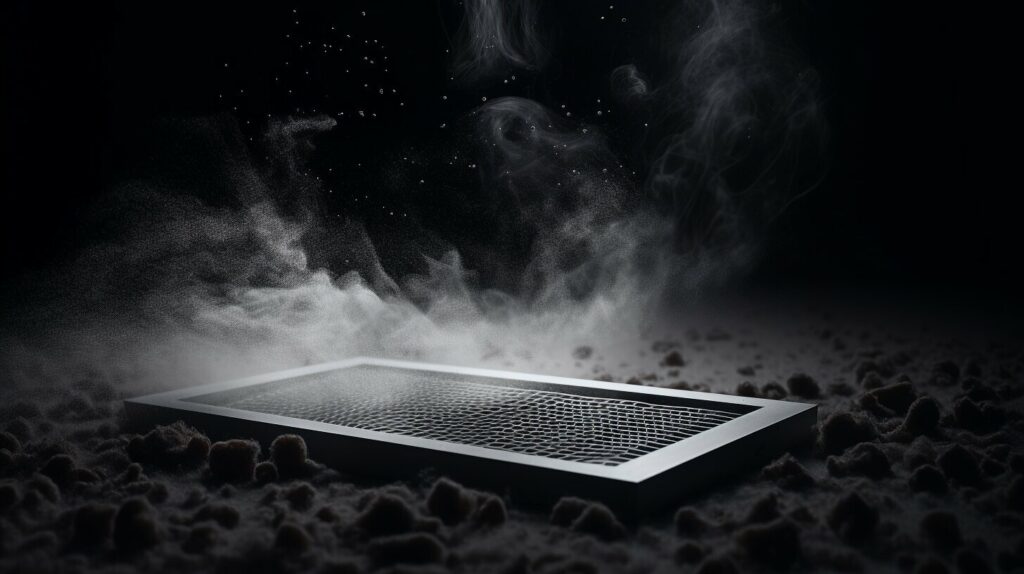
What to remember:
- Air filters are crucial for maintaining good indoor air quality and protecting your HVAC system.
- Regularly changing your air filters prevents clogs and ensures optimal system performance.
- Different types of air filters offer varying levels of filtration and airflow restriction.
- Consult with a heating and AC repair expert to determine the right type of air filter for your HVAC system.
The Role of Thermostats in Your HVAC System
When it comes to your HVAC system, the thermostat is a small but powerful device that plays a crucial role in maintaining your home’s comfort. The thermostat serves as the control center, allowing you to set the desired temperature and regulating when the heating and cooling systems turn on and off. Properly functioning thermostats are essential for accurate temperature readings and efficient operation.
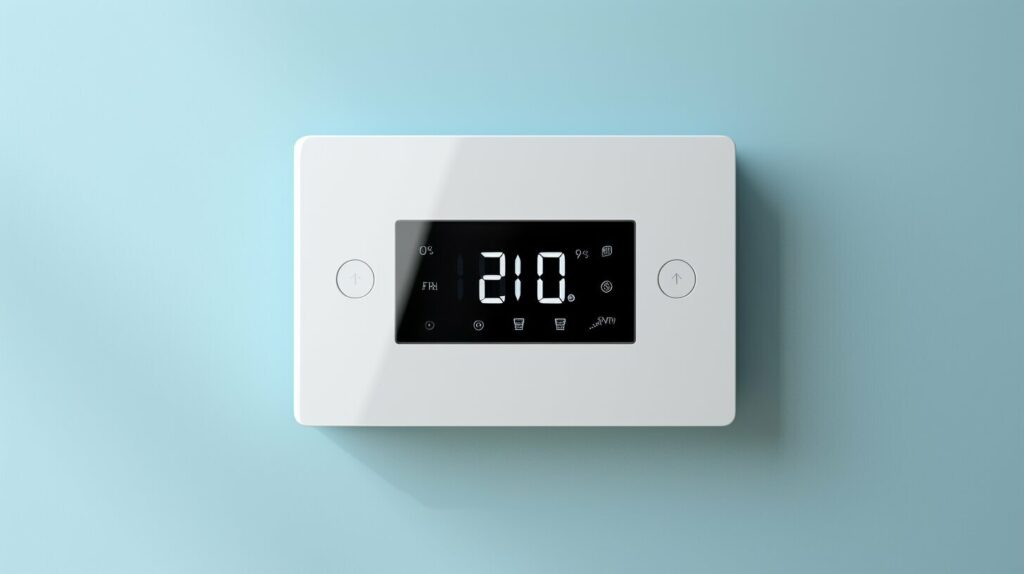
Over time, thermostats can become inaccurate due to calibration issues. If your thermostat is not properly calibrated, it may cause your HVAC system to cycle on and off too frequently, resulting in energy waste and discomfort. To ensure your thermostat is calibrated correctly, it’s recommended to have it checked by a heating and AC repair company. They can perform the necessary adjustments, ensuring your thermostat accurately reflects the temperature in your home.
If you have an older thermostat or are looking to upgrade, there are various options available on the market today. New thermostats offer advanced features that can enhance both comfort and energy efficiency. Programmable thermostats allow you to set different temperatures for different times of the day, helping you save energy when you’re not at home. Smart thermostats take it a step further, allowing you to control the temperature remotely using your smartphone or other smart devices. These smart features enable you to adjust the temperature from anywhere, ensuring your home is comfortable when you arrive.
The Benefits of Upgrading to a Smart Thermostat
Upgrading to a smart thermostat brings several benefits to your HVAC system and overall home comfort. Here are a few advantages:
- Convenience: With a smart thermostat, you can easily adjust the temperature from anywhere using your smartphone or voice commands. This allows you to control your HVAC system even when you’re not at home.
- Energy savings: Smart thermostats offer energy-saving features such as learning algorithms that adapt to your schedule and temperature preferences. They can automatically adjust the temperature when you’re away to save energy without sacrificing comfort.
- Improved comfort: Smart thermostats provide precise temperature control, allowing you to fine-tune the climate in your home. Some models even include humidity sensors to help maintain ideal indoor comfort levels.
- Integration with smart home systems: Smart thermostats can be integrated with other smart home devices, such as voice assistants or home automation systems. This enables you to create customized routines and control multiple aspects of your home with ease.
Whether you choose a programmable or smart thermostat, upgrading can enhance your HVAC system’s performance and improve your overall comfort while potentially saving on energy costs. Consult with a heating and AC repair company to determine the best thermostat option for your home and enjoy the benefits of precise temperature control and energy efficiency.
Common Problems with Your AC and Furnace
When it comes to your HVAC system, it’s important to be aware of common problems that can occur with your AC and furnace. These issues can affect the performance, efficiency, and overall comfort of your home. By understanding these problems, you can take the necessary steps to address them promptly and avoid further damage.
One common problem is a lack of airflow from your AC unit. This could be due to a clogged air filter, which restricts the flow of air and reduces cooling effectiveness. It’s important to regularly clean or replace your air filters to ensure proper airflow and prevent strain on your system. Another potential cause of poor airflow is a malfunctioning blower motor. If you notice weak airflow or warm air coming from your AC vents, it’s best to contact a heating and AC repair company to diagnose and resolve the issue.
Strange noises from your AC or furnace can be indicative of underlying problems. Banging, clunking, or squealing sounds may suggest loose or faulty parts, such as a worn-out fan belt or a malfunctioning blower motor. Ignoring these noises can lead to further damage and potentially costly repairs. It’s important to have a heating and AC repair company inspect your system as soon as possible to identify and fix the source of the noise.
| Problem | Cause | Solution |
|---|---|---|
| Lack of Airflow | Clogged air filter or malfunctioning blower motor | Clean or replace air filter; contact a heating and AC repair company for blower motor repair or replacement |
| Strange Noises | Loose or faulty parts | Contact a heating and AC repair company for inspection and repair |
If you notice any problems with your AC or furnace, it’s best to address them promptly. Delaying repairs can lead to further damage and potentially higher repair costs. A heating and AC repair company has the expertise and tools to diagnose and fix the issues with your HVAC system, ensuring that it performs optimally and provides the comfort you need.
By staying informed about common problems with your AC and furnace, you can take proactive measures to keep your HVAC system running smoothly. Regular maintenance, such as cleaning or replacing air filters and scheduling professional tune-ups, is essential for preventing issues and prolonging the lifespan of your system. If you’re experiencing any problems or have concerns about your AC or furnace, don’t hesitate to reach out to a trusted heating and AC repair company for assistance.
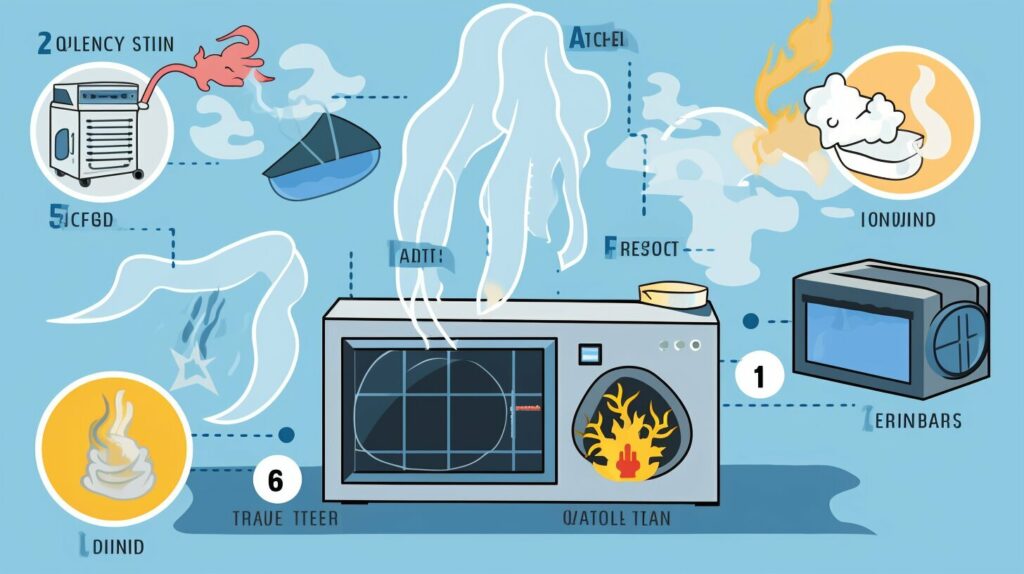
Conclusion
At our heating and AC repair company, we understand the importance of maintaining your HVAC system for efficient heating and cooling solutions. Regular maintenance and repairs are key to keeping your system running smoothly and ensuring indoor comfort. Whether it’s seasonal tune-ups, air filter changes, or addressing specific problems, we have you covered.
Upgrades and replacements are also essential for improving energy efficiency and overall performance. Our team of experts can help you choose the right HVAC system that suits your needs and budget. With our expertise, you can enjoy a comfortable home while saving on energy costs.
With a focus on energy efficiency and indoor comfort, we are dedicated to providing reliable HVAC solutions for your home. Trust us to meet all your heating and cooling needs. Contact us today for maintenance, repairs, upgrades, or replacements, and experience the highest level of service and expertise.
FAQ
What is an HVAC system and how does it work?
An HVAC system stands for heating, ventilation, and air conditioning. It includes everything related to heating and cooling your home, such as furnaces, air conditioners, and heat pumps. The system operates by heating or cooling the air and then distributing it through vents and ducts to different parts of your home.
Why is seasonal maintenance important for my HVAC system?
Seasonal maintenance is important for keeping your HVAC system in good working condition. It involves tasks such as checking and replacing air filters, cleaning the AC unit, and inspecting the furnace. Having seasonal maintenance done twice a year, in spring and fall, ensures optimal performance for the summer cooling season and the winter heating season.
How do air filters affect my HVAC system?
Air filters play a crucial role in maintaining good indoor air quality and protecting your HVAC system. They trap dust, allergens, and other contaminants before they can circulate in your home. It’s important to change your air filters regularly to prevent clogs and maintain optimal system performance.
What is the role of thermostats in my HVAC system?
Your thermostat controls when the heating and cooling systems turn on and off. It’s important to ensure that your thermostat is properly calibrated for accurate temperature readings. Programmable and smart thermostats offer advanced features that allow you to control the temperature remotely and save energy.
What are common problems with AC and furnace units?
Common problems with AC and furnace units include a lack of airflow or warm air, strange sounds like banging or clunking, and other issues. It’s crucial to contact a heating and AC repair company as soon as you notice these problems to prevent further damage and ensure optimal system performance.
Geothermal Heat Pumps
How to Boost Heat Pump Efficiency With Renewables

Think about a scenario in which our heat pumps operate more efficiently, not harder. With renewable energy readily available, we can maximize the capabilities of these systems.
In this article, we will delve into the realm of heat pump efficiency and explore how renewables can take it to new heights. From solar power to geothermal energy, wind power to biomass, we will uncover the secrets to maximizing performance and achieving sustainable mastery of our heat pumps.
Let’s embark on this journey together.
Key Takeaways
- Solar power and geothermal energy are excellent renewable energy sources for boosting heat pump efficiency.
- Incorporating solar power through the use of solar panels can reduce reliance on traditional electricity sources and lower carbon footprint.
- Geothermal heating systems utilize the constant temperature of the Earth to transfer heat between the ground and the heat pump, resulting in energy savings and reduced environmental impact.
- Wind power and biomass energy can also be integrated with heat pump systems to enhance efficiency and promote sustainability.
Understanding the Role of Renewable Energy in Heat Pump Efficiency
We can enhance the efficiency of heat pumps by utilizing renewable energy sources. Renewable energy integration plays a crucial role in optimizing the performance of heat pumps. When selecting an energy source for heat pumps, it’s important to consider various factors such as availability, cost, and environmental impact.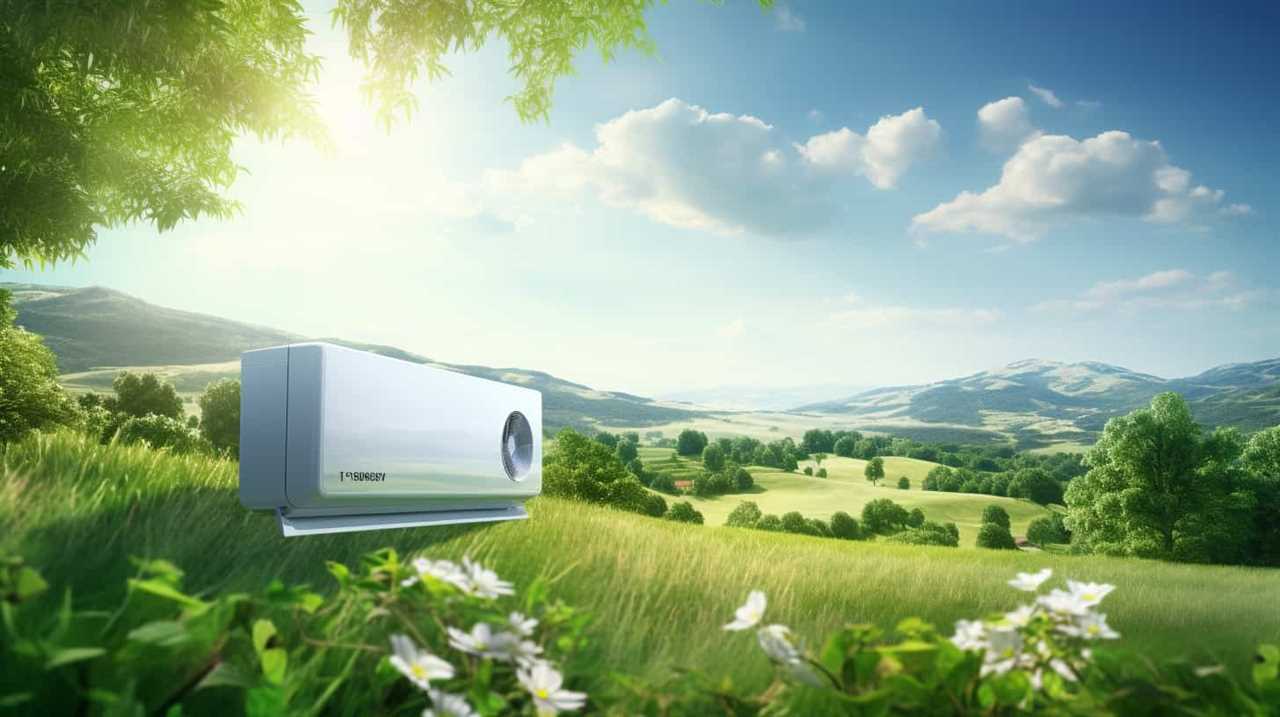
Solar energy is a popular choice for renewable energy integration due to its abundance and low carbon emissions. By harnessing the power of the sun, heat pumps can operate more efficiently and reduce reliance on conventional energy sources.
Another option is geothermal energy, which utilizes the heat from the Earth’s core to provide heating and cooling. Geothermal systems can significantly improve the efficiency of heat pumps, especially in regions with stable ground temperatures.
Carefully evaluating energy source options is essential for maximizing the efficiency of heat pumps and reducing their carbon footprint.
Evaluating the Benefits of Solar Power for Heat Pump Performance
By evaluating the benefits of solar power, we can determine its impact on heat pump performance. When considering solar power for heat pump performance, there are several key advantages to take into account:
Solar panel installation: Installing solar panels allows you to generate clean and renewable energy directly from the sun. This reduces your reliance on traditional electricity sources and helps lower your carbon footprint.
Photovoltaic technology: Solar panels use photovoltaic technology to convert sunlight into electricity. This means that the energy generated can be used to power your heat pump, reducing the amount of electricity you need to draw from the grid.
Increased efficiency: Pairing solar power with your heat pump can increase its overall efficiency. By utilizing the free and abundant energy from the sun, your heat pump can operate more efficiently, leading to energy savings and lower utility bills.
Incorporating solar power into your heat pump system can have a significant impact on its performance and efficiency. With solar panel installation and the use of photovoltaic technology, you can maximize the benefits of renewable energy for your heat pump.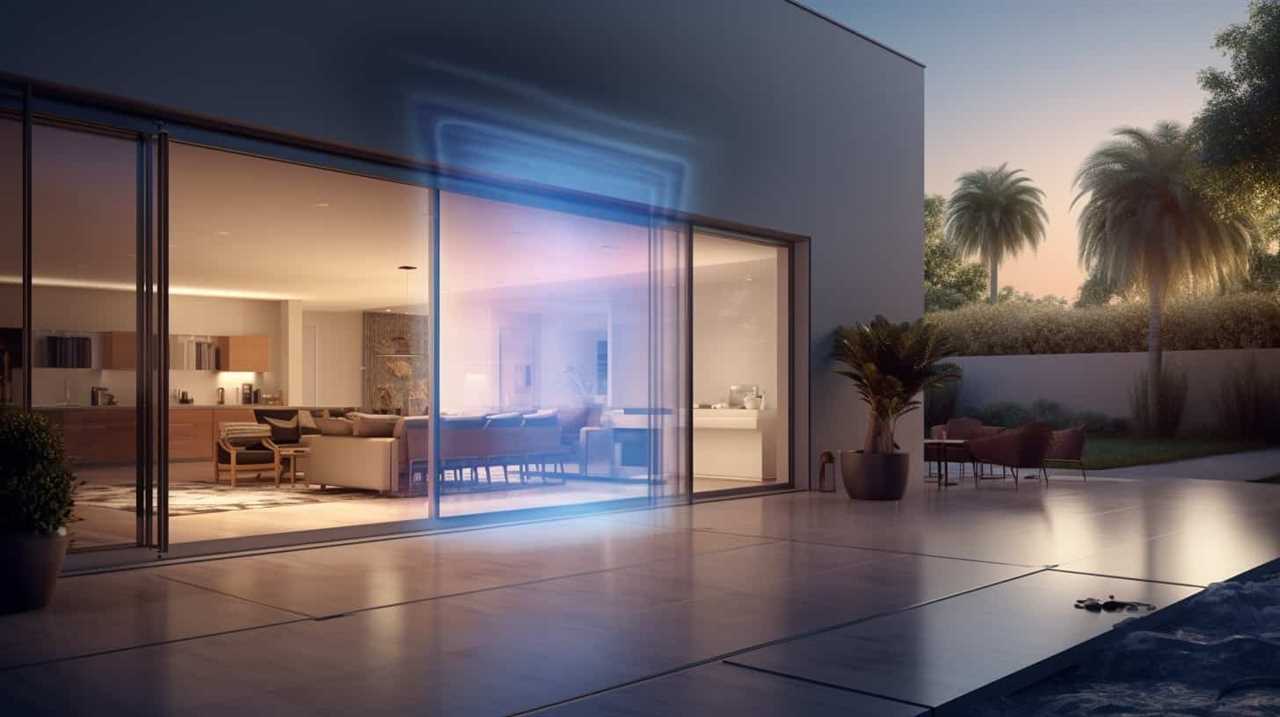
Harnessing Geothermal Energy to Enhance Heat Pump Efficiency
One way to enhance heat pump efficiency is by harnessing geothermal energy. Geothermal heating systems utilize the constant temperature of the earth to provide heating and cooling for residential and commercial buildings. These systems rely on a process called geothermal heat exchange, where heat is transferred between the ground and the heat pump.
The ground acts as a heat source during the winter months, while in the summer it acts as a heat sink. By tapping into this renewable energy source, heat pumps can achieve higher levels of efficiency compared to traditional heating and cooling methods.
Geothermal systems require a well-designed and properly installed ground loop system to effectively transfer heat. It’s essential to consider factors such as soil composition, sizing, and layout to optimize system performance.
With the integration of geothermal energy, heat pumps can operate more efficiently, resulting in significant energy savings and reduced environmental impact.
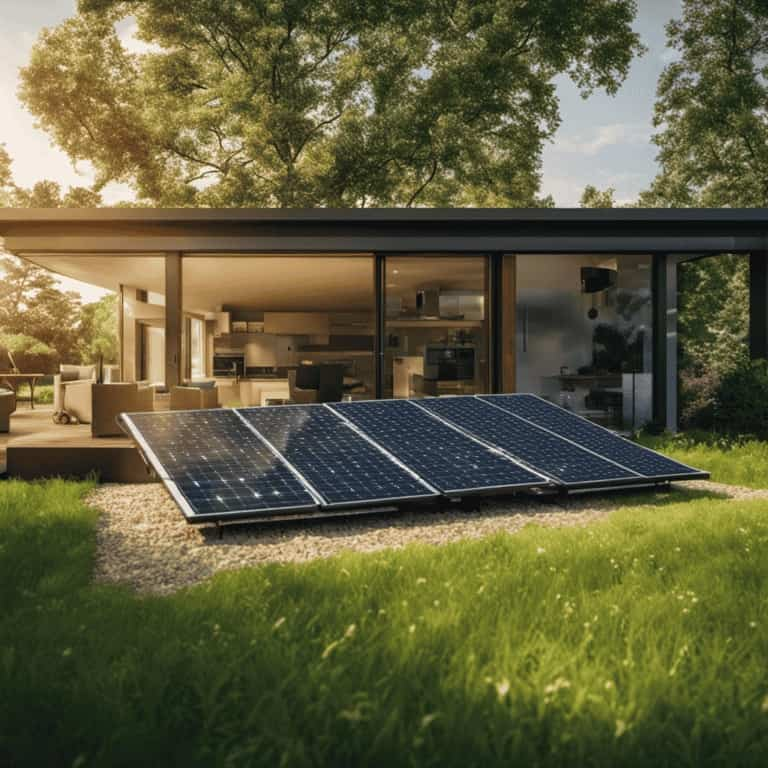
Maximizing Wind Power to Optimize Heat Pump Operation
To optimize heat pump operation, we can maximize wind power through the use of wind turbines. Incorporating wind power integration and wind energy optimization can significantly enhance the efficiency of heat pumps.
Here are three ways to maximize wind power for optimal heat pump operation:
Install on-site wind turbines to generate electricity directly for the heat pump system.
Utilize grid-connected wind power by sourcing electricity from wind farms.
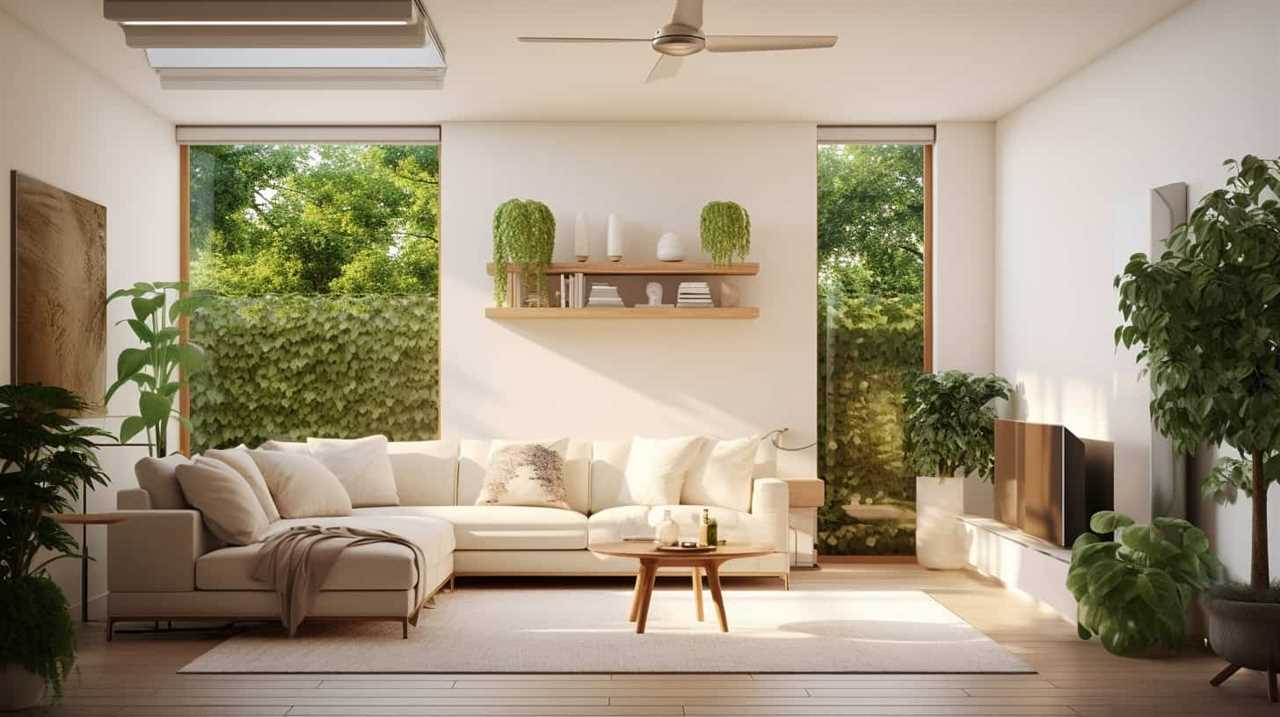
Implement smart controls and energy management systems to synchronize heat pump operation with wind power availability.
By integrating wind power into heat pump systems, we can reduce the reliance on traditional energy sources and decrease carbon emissions. Wind power offers a sustainable and renewable energy solution that aligns with the goal of achieving maximum heat pump efficiency.
Now, let’s explore another renewable energy source, biomass, to further enhance the efficiency of heat pump systems.
Exploring Biomass Energy for Sustainable Heat Pump Efficiency
Our exploration of biomass energy reveals its potential for enhancing the efficiency of heat pump systems.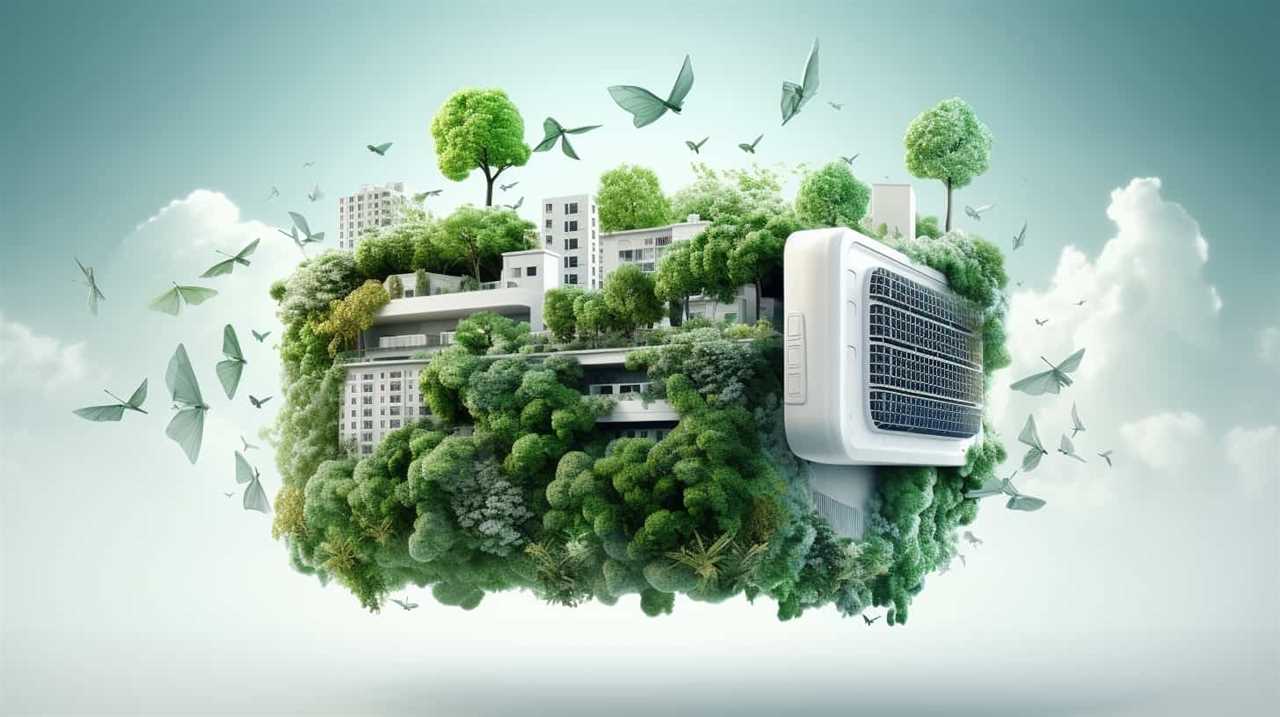
Biomass sustainability refers to the use of organic materials, such as wood pellets, agricultural waste, or dedicated energy crops, to generate heat. By utilizing biomass as a renewable fuel source, heat pumps can achieve carbon neutral heating, significantly reducing greenhouse gas emissions.
Biomass sustainability ensures that the materials used for fuel are replaced or regenerated at a rate equal to or faster than their consumption. This practice not only minimizes environmental impact but also ensures long-term availability of biomass resources.
Integrating biomass energy with heat pump systems offers a sustainable solution for efficient heating, providing an environmentally friendly alternative to fossil fuel-based heating methods.
Frequently Asked Questions
Can Heat Pumps Only Be Powered by Renewable Energy Sources?
Heat pumps can be powered by a variety of energy sources, including renewable ones. By utilizing renewable energy sources, such as solar or geothermal, heat pump efficiency can be boosted, reducing reliance on non-renewable fuels.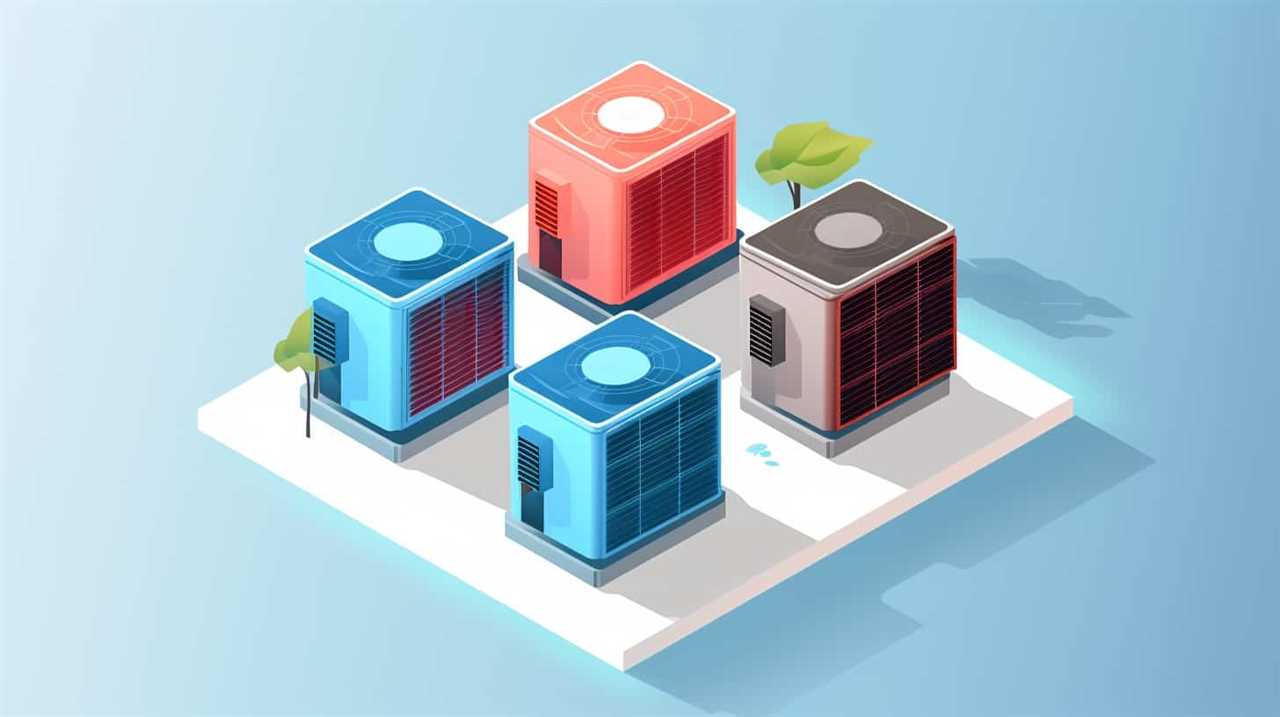
What Are the Main Advantages of Using Solar Power in Conjunction With a Heat Pump?
The advantages of using solar power in conjunction with a heat pump include increased energy efficiency, reduced reliance on fossil fuels, and lower carbon emissions. Solar power can significantly boost heat pump efficiency and contribute to a more sustainable and environmentally friendly heating system.
How Does Geothermal Energy Specifically Improve the Efficiency of Heat Pumps?
Geothermal energy is a game-changer when it comes to boosting heat pump efficiency. It harnesses the Earth’s natural heat, providing a constant and renewable source of energy. This translates to improved performance and lower energy costs.
Is Wind Power a Viable Option for Powering Heat Pumps in All Locations?
Wind power has limitations as an alternative energy source for heat pumps in certain locations. However, there are other renewables, such as solar and geothermal energy, that can be more viable options to boost heat pump efficiency.
What Are the Environmental Benefits of Using Biomass Energy in Heat Pump Systems?
Using biomass energy in heat pump systems provides several environmental benefits. It enhances efficiency by utilizing renewable energy sources. This reduces greenhouse gas emissions and dependence on fossil fuels, contributing to a cleaner and sustainable energy future.

Can Using Renewables Help Pay for an Energy-Efficient Heat Pump?
Using renewables can definitely help pay for energy-efficient heat pumps. By harnessing natural sources like sunlight and wind, renewable energy can power these heat pumps, thus reducing electricity costs. Additionally, governments often offer incentives and tax credits for using renewables, which can further offset the initial investment of installing energy-efficient heat pumps. This makes them a cost-effective and sustainable option for heating and cooling.
Conclusion
In conclusion, by harnessing the power of renewables such as solar, geothermal, wind, and biomass energy, we can unlock the full potential of heat pump efficiency.
Like a symphony of nature’s elements, these renewable sources harmonize with our heat pumps, maximizing their performance and sustainability.
With each renewable energy source playing its unique role, we can create a rhythm of efficiency that flows seamlessly, providing us with a practical and environmentally friendly solution for heating and cooling our spaces.
Geothermal Heat Pumps
Transforming Homes With High-Efficiency HVAC and Heat Pump Systems

Picture a world where our houses are more than just places to stay, but rather sanctuaries of comfort and efficiency. By using high-efficiency HVAC and heat pump systems, we can turn our homes into energy-saving machines, giving us the best heating and cooling possible.
In this article, we will explore the benefits of these innovative systems, understand the technology behind heat pumps, and discover how upgrading our HVAC systems can bring us improved comfort and liberation from high energy bills.
Key Takeaways
- High-efficiency HVAC and heat pump systems save money through energy efficiency.
- These systems improve indoor air quality by removing dust and allergens.
- They reduce carbon footprint by producing fewer greenhouse gas emissions.
- High-efficiency HVAC and heat pump systems provide optimal heating and cooling for homes, enhancing comfort and well-being in indoor environments.
The Benefits of High-Efficiency HVAC Systems
We love high-efficiency HVAC systems because they save us money and keep us comfortable. These systems bring a multitude of benefits to our homes, including improved indoor air quality and a reduced carbon footprint.
High-efficiency HVAC systems utilize advanced filtration technology to remove dust, allergens, and pollutants from the air, resulting in cleaner and healthier indoor environments. Additionally, these systems are designed to operate with maximum energy efficiency, consuming less energy and producing fewer greenhouse gas emissions.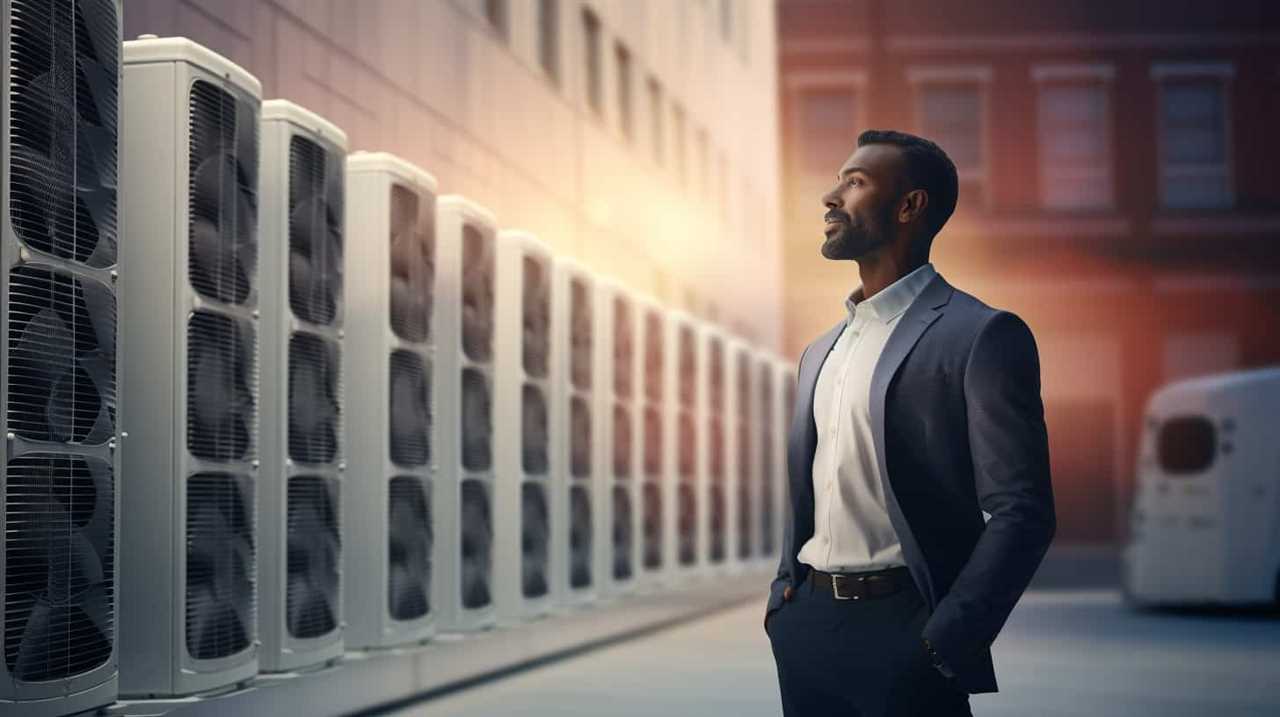
Understanding Heat Pump Technology for Home Heating and Cooling
To fully grasp the benefits of heat pump technology for home heating and cooling, it’s important to understand how these systems work and the advantages they offer. Heat pumps are highly efficient devices that transfer heat from one place to another, providing both heating and cooling for homes. Unlike traditional heating and cooling systems, which generate heat or cool air, heat pumps simply move heat from one location to another.
Heat pump efficiency is measured by the Coefficient of Performance (COP), which indicates the amount of heat produced for every unit of electricity consumed. Generally, high-efficiency heat pumps have a COP of 3 or higher, meaning they produce three units of heat for every unit of electricity consumed. This makes them significantly more energy-efficient than conventional heating systems.
Heat pump installation involves placing an outdoor unit, known as the condenser, and an indoor unit, called the evaporator, connected by refrigerant lines. The outdoor unit extracts heat from the air or ground and transfers it to the indoor unit, which then distributes it throughout the house.
Understanding the inner workings and benefits of heat pump technology sets the stage for discussing the energy savings that can be achieved with high-efficiency HVAC and heat pump systems.
Energy Savings With High-Efficiency HVAC and Heat Pump Systems
With high-efficiency HVAC and heat pump systems, significant energy savings can be achieved through improved efficiency and reduced electricity consumption. This not only leads to cost savings, but also has a positive environmental impact.
Here are two key ways in which these systems contribute to energy savings:
Enhanced Efficiency: High-efficiency HVAC and heat pump systems utilize advanced technologies, such as variable speed motors and smart thermostats, to optimize energy usage. These systems can adjust their output based on the actual heating or cooling needs of the home, resulting in reduced energy waste.
Reduced Electricity Consumption: High-efficiency HVAC and heat pump systems require less electricity to operate compared to traditional systems. This is due to their ability to transfer heat rather than generate it, resulting in lower energy consumption and decreased reliance on fossil fuels.

Upgrading Your Home’s HVAC System for Improved Comfort and Efficiency
Upgrading your home’s HVAC system can provide improved comfort and efficiency by incorporating modern technologies and energy-saving features. By investing in a high-efficiency HVAC system, you can significantly increase energy efficiency and reduce your carbon footprint.
These systems are designed to consume less energy while providing the same level of comfort in your home. They utilize advanced technologies such as variable-speed motors, smart thermostats, and zoning systems to optimize energy usage. Additionally, high-efficiency HVAC systems are equipped with features like programmable timers and sensors that allow you to control and customize your home’s temperature according to your needs. This not only enhances your comfort but also helps to reduce unnecessary energy consumption.
Upgrading your HVAC system is a smart move that not only improves your home’s comfort but also contributes to a greener and more sustainable future.
Choosing the Right High-Efficiency HVAC and Heat Pump System for Your Home
We can select the right high-efficiency HVAC and heat pump system for our home by considering our specific needs and evaluating the available options. Here are some important factors to consider:
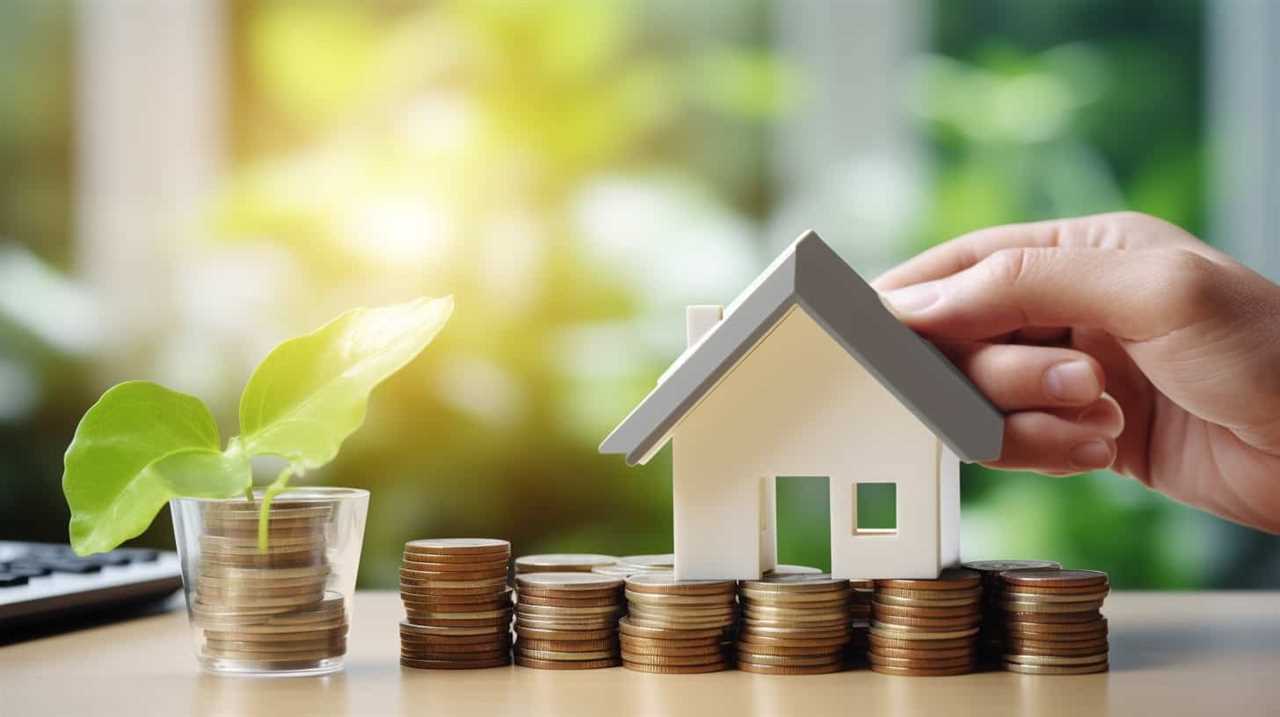
Selecting the appropriate size for your HVAC and heat pump system:
Assess the size of your home and the heating and cooling load requirements.
Consult with HVAC professionals to determine the right size based on square footage, insulation, and climate conditions.
Understanding the maintenance requirements of high efficiency systems:

Regularly clean and replace air filters to ensure optimal performance and indoor air quality.
Schedule annual maintenance inspections by licensed professionals to detect any issues and keep the system running efficiently.
Frequently Asked Questions
How Often Should High-Efficiency HVAC Systems Be Serviced or Maintained?
We should regularly service and maintain our high-efficiency HVAC systems to ensure optimal performance and longevity. By conducting frequent maintenance, we can enjoy the benefits of improved energy efficiency, lower utility bills, and a comfortable living environment.
Are There Any Government Incentives or Rebates Available for Installing High-Efficiency HVAC and Heat Pump Systems?
Yes, there are government incentives and rebates available for installing high-efficiency HVAC and heat pump systems. These incentives aim to promote energy savings and make these systems more accessible to homeowners.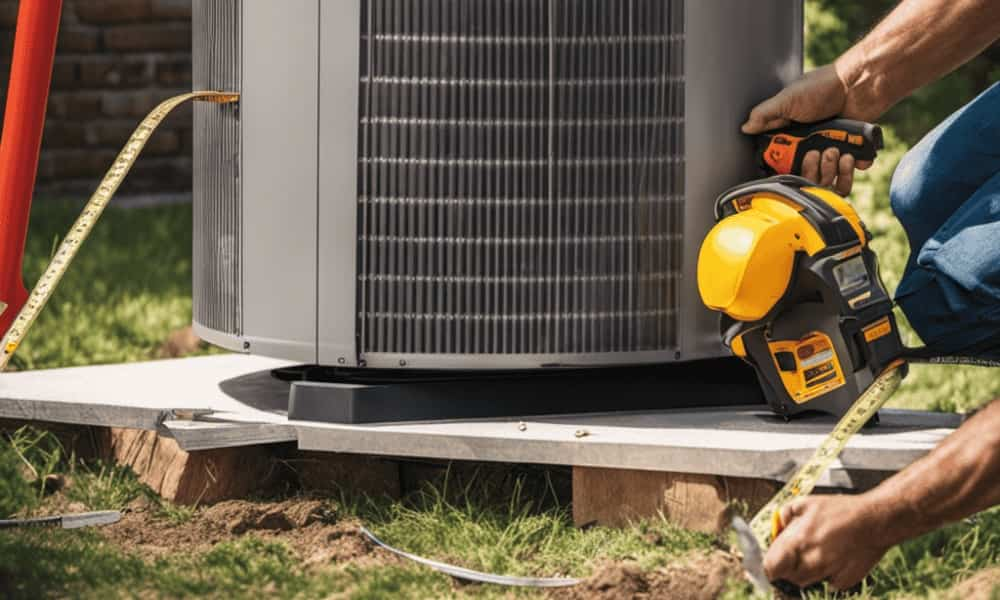
Can High-Efficiency HVAC Systems Be Integrated With Smart Home Technology?
Yes, high-efficiency HVAC systems can be seamlessly integrated with smart home technology. However, there may be some integration challenges and it’s important to assess the cost effectiveness of such a system before making the investment.
What Is the Average Lifespan of a High-Efficiency HVAC System?
The average lifespan of a high-efficiency HVAC system depends on regular maintenance frequency. With proper care, these systems can last for 15-20 years, providing efficient heating and cooling for our homes.
Are There Any Specific Requirements or Considerations for Installing High-Efficiency HVAC and Heat Pump Systems in Older Homes?
When installing high-efficiency HVAC and heat pump systems in older homes, there are specific challenges and cost considerations. It’s important to assess the existing infrastructure, insulation, and electrical capacity to ensure compatibility and optimal performance.
What Are the Benefits of Using High-Efficiency Heat Pumps for HVAC Systems?
High-efficiency heat pumps offer multiple benefits for HVAC systems, including green heating with heat pumps. By utilizing energy transfer principles, these systems can extract heat from the outside air and transfer it indoors, providing efficient heating in colder months. This reduces the reliance on traditional fossil fuel-based heating methods, helping to lower carbon emissions and provide cost savings. Additionally, high-efficiency heat pumps can also provide cooling during warmer seasons, offering year-round comfort and efficiency.
Conclusion
In conclusion, upgrading to high-efficiency HVAC and heat pump systems not only improves the comfort and efficiency of our homes but also leads to significant energy savings.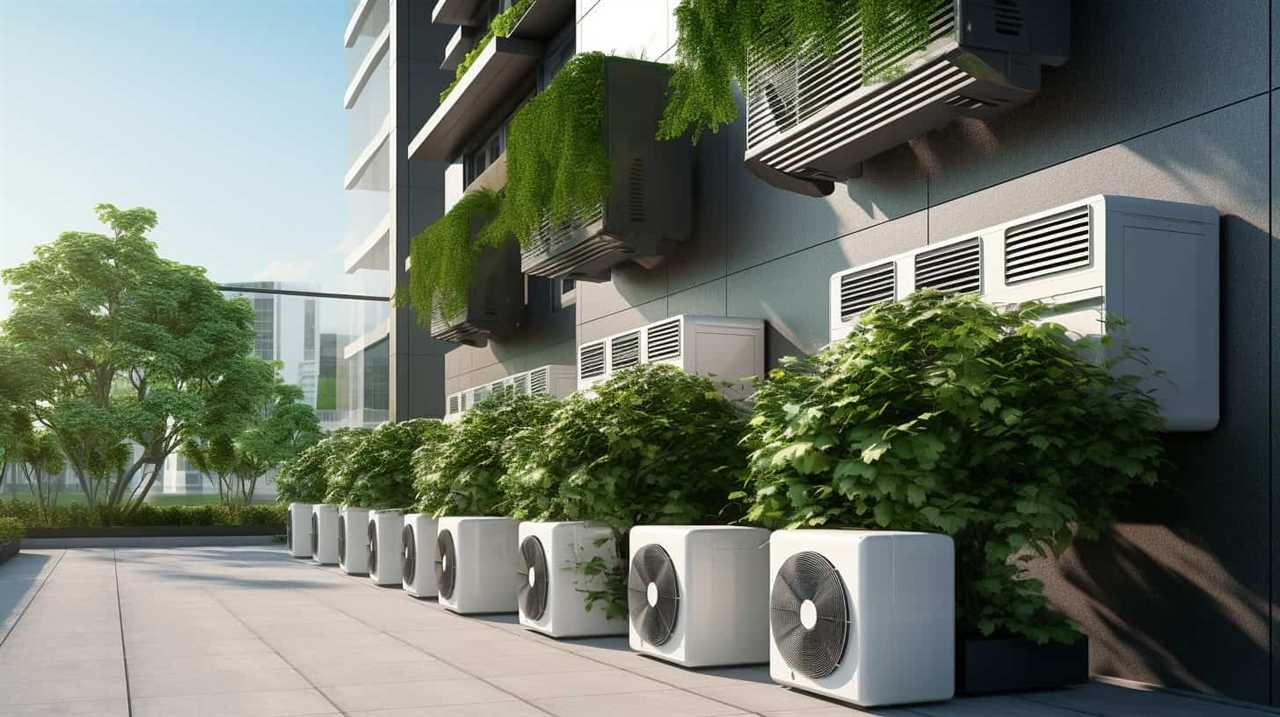
In fact, studies have shown that these systems can reduce energy consumption by up to 50%.
This means that not only will we enjoy a more comfortable living space, but we’ll also contribute to a more sustainable future by reducing our carbon footprint.
Geothermal Heat Pumps
Comparing Heat Pump Efficiency in Sustainable Buildings

In this article, we will explore sustainable buildings and analyze the effectiveness of heat pumps.
We will explore the factors that affect heat pump efficiency, the different types of heat pump systems available for green buildings, and the energy efficiency ratings for these systems in sustainable construction.
By analyzing the performance of heat pumps in green buildings, we aim to provide you with the best practices for optimizing heat pump efficiency in sustainable construction.
Get ready to master the art of comparing heat pump efficiency in sustainable buildings!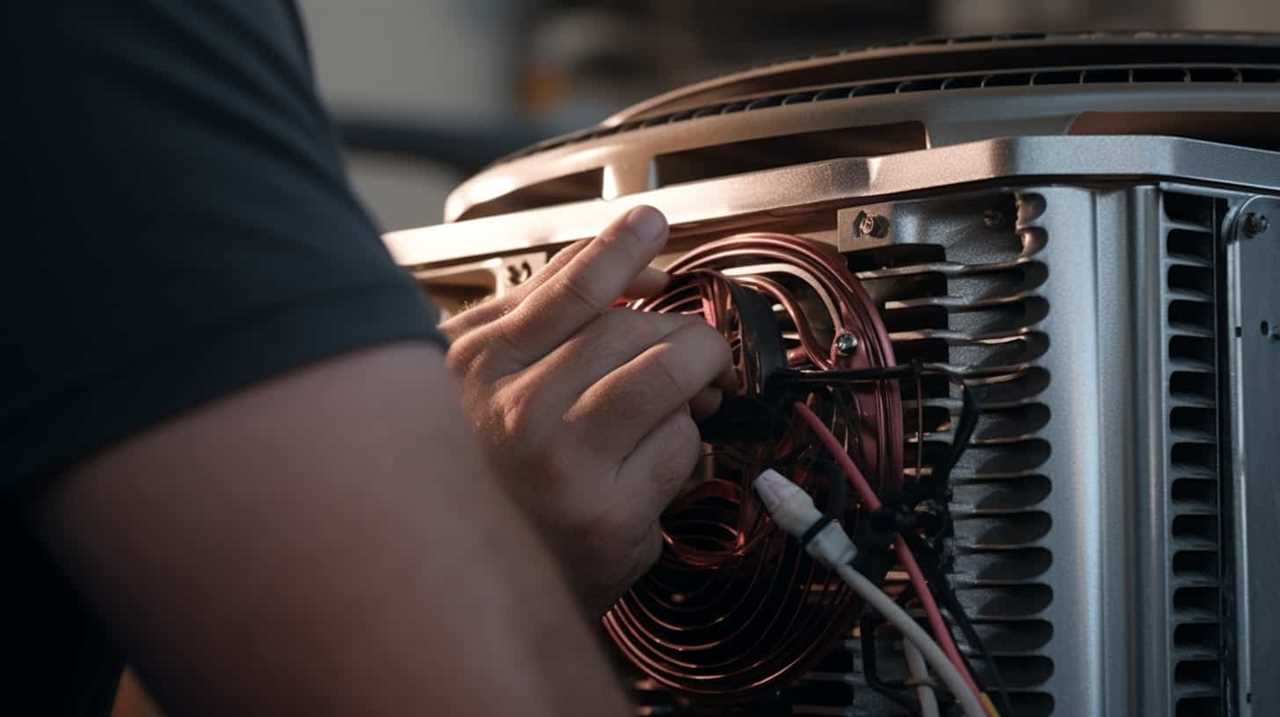
Key Takeaways
- Availability of incentives for heat pumps can play a significant role in promoting their usage in sustainable buildings.
- The impact of climate on heat pump efficiency highlights the need for careful consideration of local climate conditions when choosing a heat pump system.
- The importance of insulation in maximizing heat pump efficiency emphasizes the need for proper insulation in sustainable buildings.
- Regular maintenance is crucial for sustaining heat pump efficiency and ensuring optimal performance over time.
Factors Affecting Heat Pump Efficiency in Sustainable Buildings
In our research, we’ve identified several key factors that affect the efficiency of heat pumps in sustainable buildings.
One of these factors is the availability of incentives for heat pumps. Governments and organizations around the world are recognizing the importance of transitioning to more sustainable energy sources, and as a result, they’re offering various incentives to promote the adoption of heat pumps. These incentives can include tax credits, grants, and rebates, which can significantly reduce the upfront costs of installing a heat pump system.
Another factor that affects heat pump efficiency is the climate in which they’re installed. Heat pumps work by extracting heat from the air or ground, and the efficiency of this process is influenced by the temperature and humidity levels. In colder climates, where temperatures drop below freezing, heat pump efficiency may decrease, requiring additional energy to maintain desired indoor temperatures. Therefore, it’s crucial to consider the impact of climate on heat pump efficiency when designing and operating sustainable buildings.
Types of Heat Pump Systems for Green Buildings
When considering heat pump systems for green buildings, we must evaluate the different types available to determine the most suitable option. Two common types of heat pump systems for green buildings are geothermal heat pumps and air source heat pumps.
Geothermal heat pumps use the stable temperature of the ground or water as a heat source or sink. They achieve high efficiency by utilizing the relatively constant temperatures available underground. Geothermal heat pumps can provide both heating and cooling, making them versatile for various climates.
On the other hand, air source heat pumps extract heat from the outdoor air and transfer it indoors. They’re easier to install and require less space compared to geothermal heat pumps. However, their efficiency may vary depending on the outdoor temperature.
Both geothermal and air source heat pumps offer energy-efficient solutions for green buildings. The choice between the two depends on factors such as available space, local climate, and budget considerations.
Energy Efficiency Ratings for Heat Pumps in Sustainable Construction
For our evaluation of heat pump efficiency in sustainable construction, we’ll analyze the energy efficiency ratings of different heat pump systems. Energy efficiency ratings provide essential information about the performance of heat pumps and their ability to save energy. These ratings are determined by industry standards and are based on the ratio of heat output to electricity input.

The higher the rating, the more efficient the heat pump is in converting energy into heat. Energy-saving technologies incorporated into heat pumps, such as variable-speed compressors and smart controls, can further enhance their efficiency.
Comparing the Performance of Heat Pumps in Green Buildings
We will assess and compare the performance of heat pumps in green buildings to determine their effectiveness in providing efficient heating and cooling solutions. A comparison of heat pump performance in green buildings can help us understand the benefits of using these systems in sustainable construction. To facilitate this comparison, we have created a table that highlights the key performance metrics of different heat pump models in green buildings. This data-driven approach allows us to analyze the efficiency, energy consumption, and environmental impact of each heat pump. By examining these factors, we can identify the most effective heat pump solutions for sustainable construction projects. Transitioning into the next section, we will now explore best practices for optimizing heat pump efficiency in sustainable construction.
| Heat Pump Model | Efficiency (COP) | Energy Consumption (kW) | Environmental Impact (CO2 emissions) |
|---|---|---|---|
| Model A | 4.5 | 8.2 | 2.5 tons |
| Model B | 3.8 | 9.6 | 3.1 tons |
| Model C | 5.2 | 7.5 | 2.2 tons |
| Model D | 4.2 | 8.8 | 2.8 tons |
| Model E | 4.8 | 7.9 | 2.4 tons |
Best Practices for Optimizing Heat Pump Efficiency in Sustainable Construction
To maximize heat pump efficiency in sustainable construction, we recommend implementing proper insulation and regular maintenance. These best practices can significantly improve the performance and energy efficiency of heat pumps, leading to reduced energy consumption and lower greenhouse gas emissions.
Here are three key strategies for optimizing heat pump efficiency: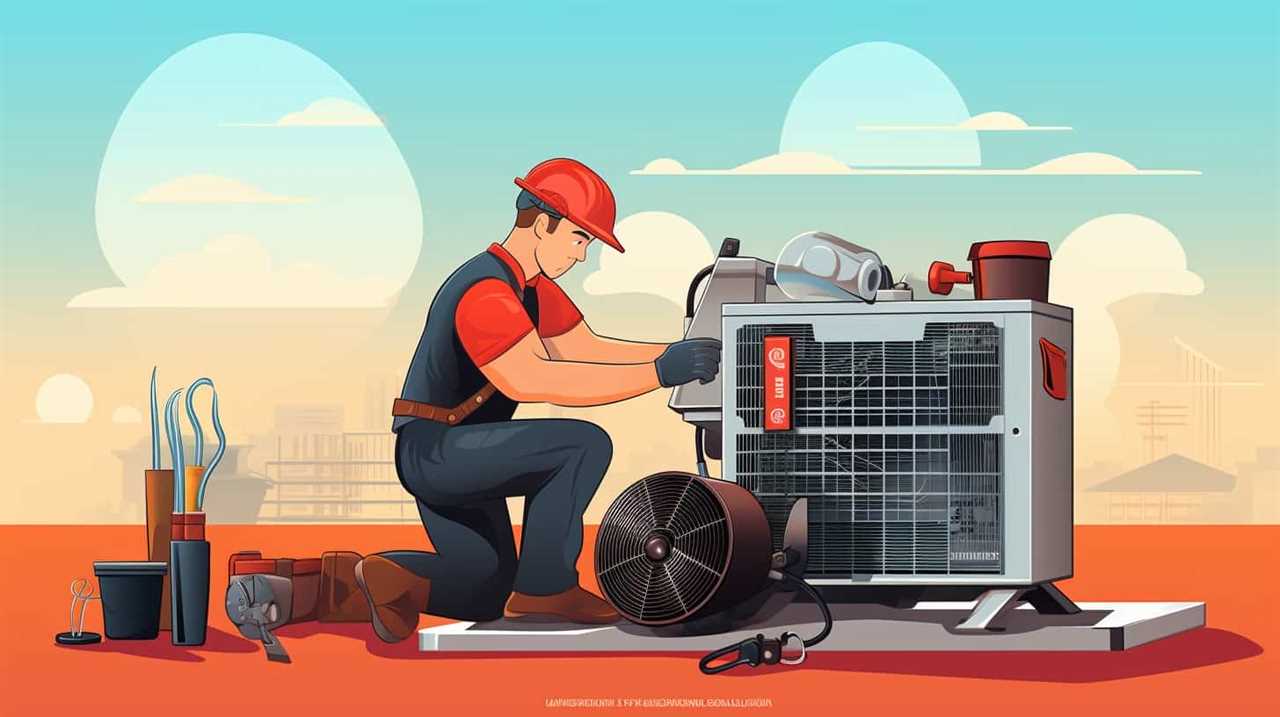
-
Optimizing insulation: Ensuring that the building envelope is well-insulated helps minimize heat loss and maintain a consistent indoor temperature. This reduces the workload on the heat pump, allowing it to operate more efficiently.
-
Renewable energy integration: Pairing heat pumps with renewable energy sources, such as solar panels or geothermal systems, can further enhance their efficiency. By utilizing clean and sustainable energy, heat pumps can operate at higher COP (Coefficient of Performance) values, resulting in greater energy savings.
-
Regular maintenance: Conducting routine maintenance, including filter cleaning, refrigerant checks, and system inspections, is crucial for maintaining optimal heat pump performance. Regular maintenance helps identify and address any issues promptly, preventing energy inefficiencies and potential breakdowns.
Frequently Asked Questions
How Are Heat Pumps Different From Traditional Heating and Cooling Systems?
Heat pumps differ from traditional heating and cooling systems by utilizing the heat transfer process to efficiently heat or cool a space. This results in lower energy consumption and higher efficiency compared to conventional systems.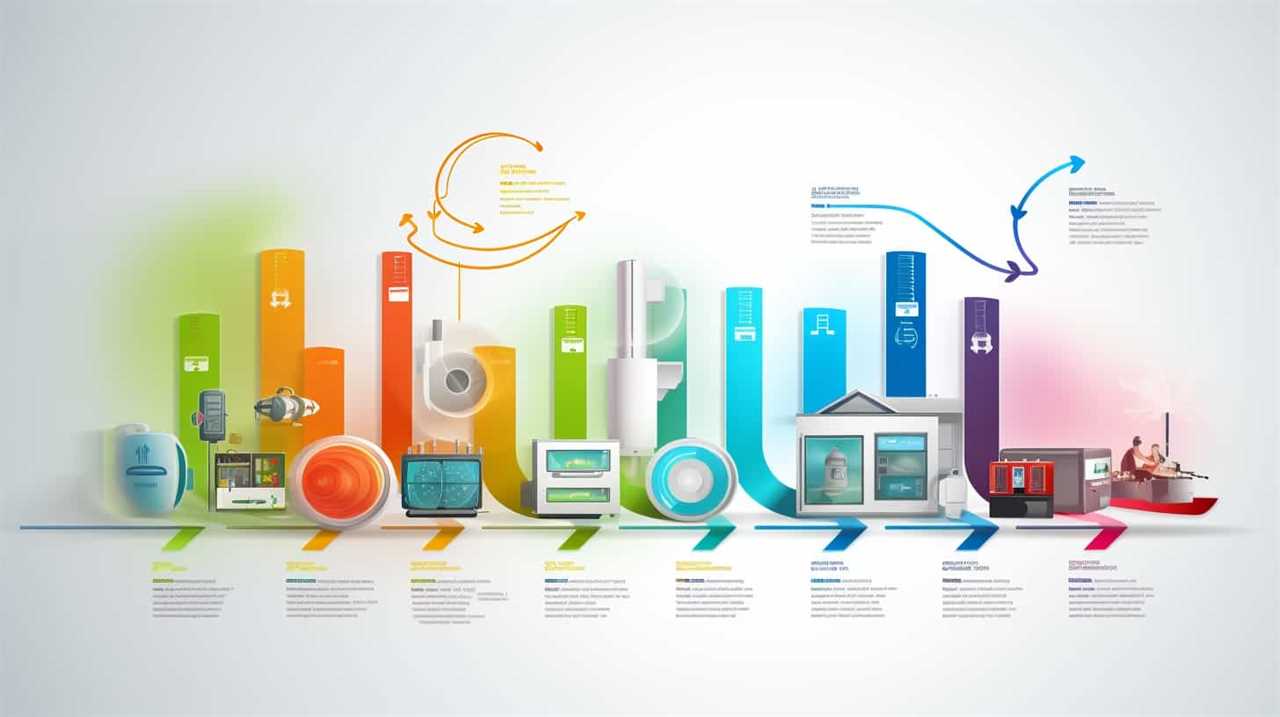
What Are the Environmental Benefits of Using Heat Pumps in Sustainable Buildings?
Using heat pumps in sustainable buildings offers numerous advantages. They have a positive impact on the environment by reducing greenhouse gas emissions, improving energy efficiency, and promoting renewable energy sources.
Are There Any Financial Incentives Available for Installing Heat Pumps in Green Buildings?
Financial incentives are available for installing heat pumps in green buildings, which can help offset the installation costs. These incentives can include tax credits, rebates, and grants, making heat pump adoption a more financially viable option for sustainable building projects.
Can Heat Pumps Be Used in All Types of Sustainable Buildings, Regardless of Size or Design?
Heat pump compatibility varies in different sustainable buildings, regardless of size or design. However, implementing heat pumps can lead to significant energy savings, making them a viable option for many green buildings.
What Maintenance and Care Is Required for Heat Pumps to Ensure Optimal Efficiency in Sustainable Construction?
To ensure optimal efficiency in sustainable construction, heat pump maintenance is crucial. Regularly cleaning or replacing air filters, checking refrigerant levels, and inspecting coils are essential tasks. Neglecting maintenance can lead to decreased energy efficiency and higher operating costs.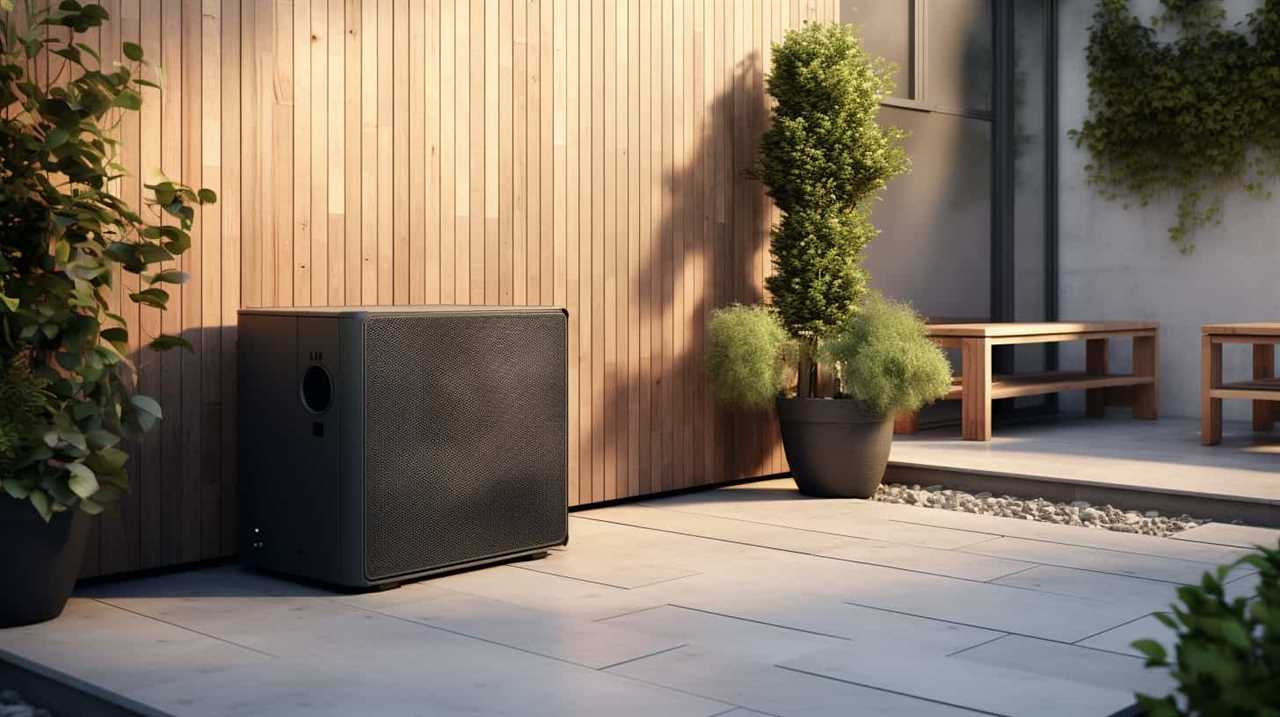
Conclusion
In conclusion, when it comes to heat pump efficiency in sustainable buildings, careful consideration of factors such as insulation, system type, and energy ratings is crucial. By optimizing these aspects, we can achieve significant energy savings and reduce carbon emissions.
For example, a study conducted in a green building with an efficient heat pump system showed a 30% reduction in energy consumption compared to traditional heating methods.
Just like a well-conducted symphony, the harmonious combination of these factors can create a sustainable rhythm for our planet’s future.
-

 Residential and Commercial Applications2 weeks ago
Residential and Commercial Applications2 weeks agoBest Amana Heat Pump Reviews
-

 Thermal Energy Transfer2 weeks ago
Thermal Energy Transfer2 weeks agoBreakthroughs in Modern Heat Pump Systems: Thermal Energy Edition
-

 Residential and Commercial Applications2 weeks ago
Residential and Commercial Applications2 weeks agoBest Heat Pump
-

 Geothermal Heat Pumps3 months ago
Geothermal Heat Pumps3 months agoUpgrade Your Comfort with Our Efficient HVAC Systems
-

 Air Conditioning3 months ago
Air Conditioning3 months agoExploring Energy-Efficient Air Conditioning Heat Pumps
-

 Geothermal Heat Pumps3 months ago
Geothermal Heat Pumps3 months agoInnovative Geothermal Heat Pump Manufacturers Revolutionize Energy Efficiency
-

 Thermal Energy Transfer1 month ago
Thermal Energy Transfer1 month agoBoost Your Heat Pump Efficiency: Interactive Guide
-

 Residential and Commercial Applications2 weeks ago
Residential and Commercial Applications2 weeks agoBest Portable Heat Pump Heat & AC










